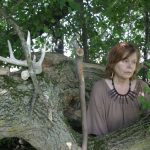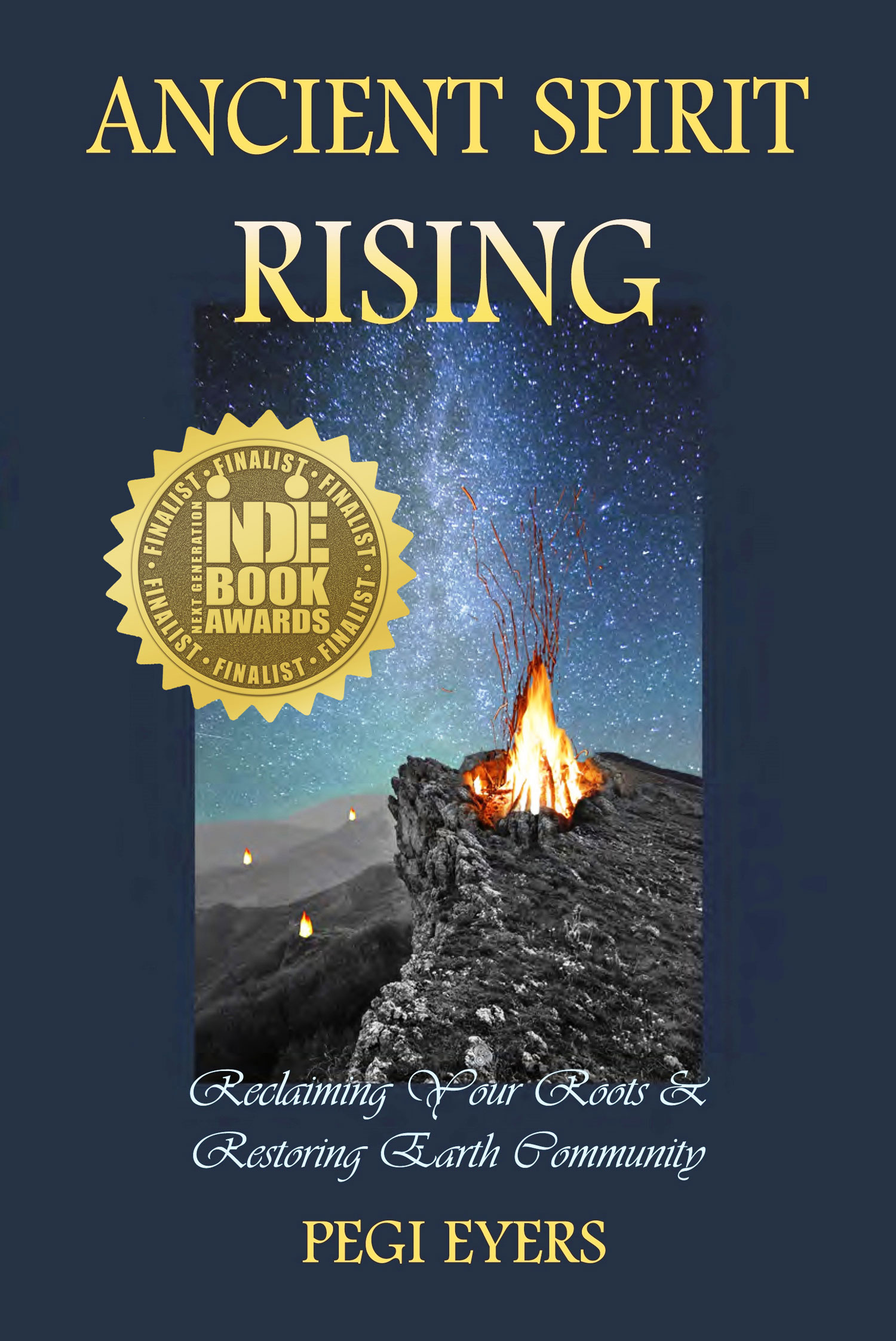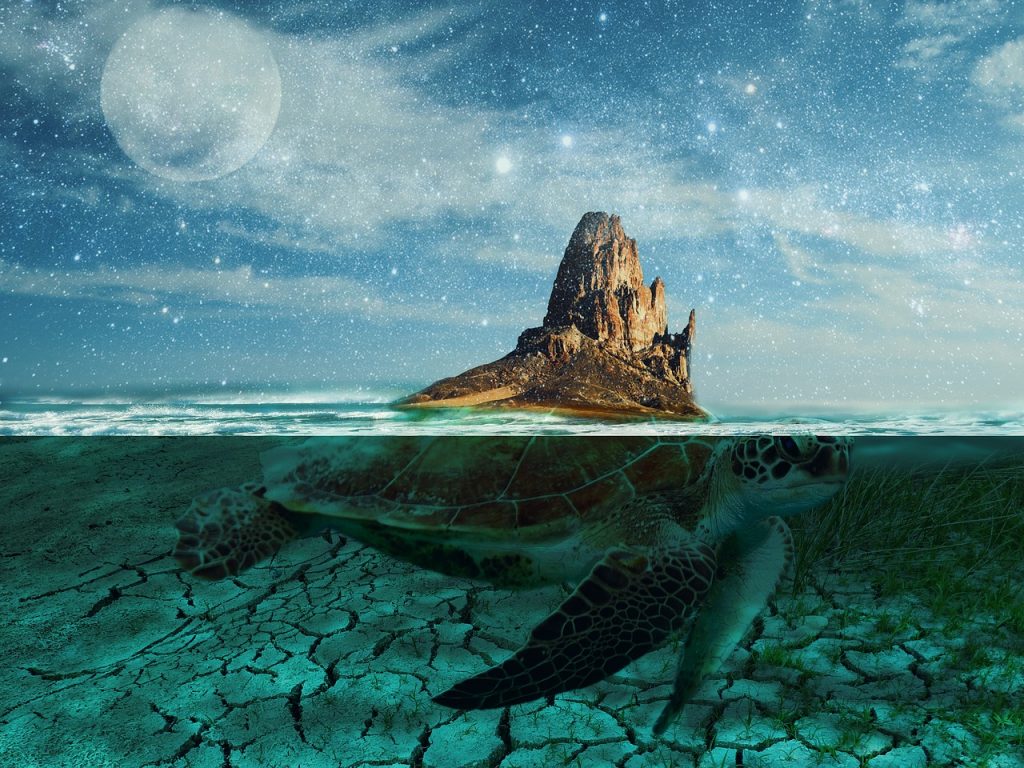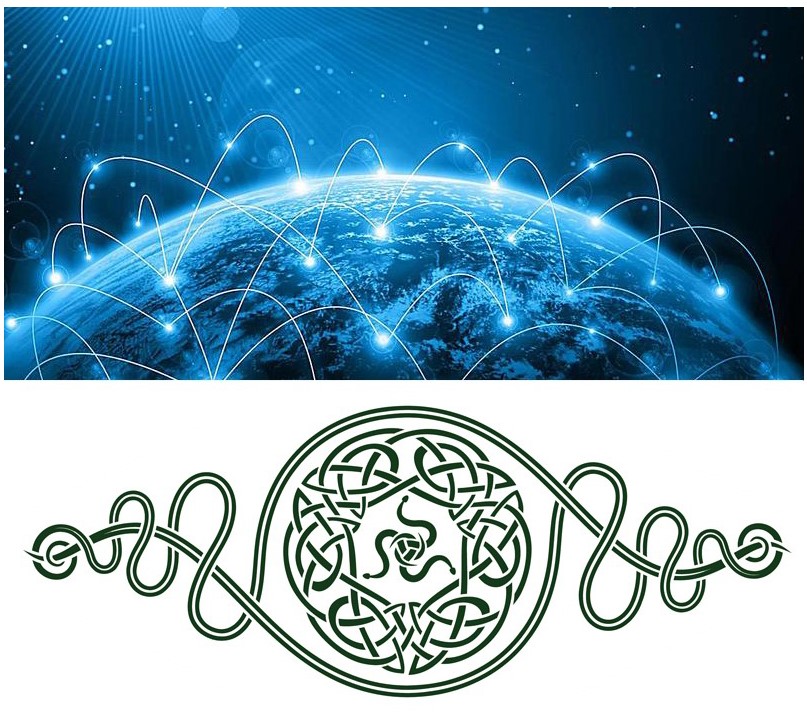It is with pleasure that we welcome our AoM for May, Pegi Eyers, and her book, Ancient Spirit Rising: Reclaiming Your Roots & Restoring Earth Community.
Ancient Spirit Rising is a compendium for change. It provides clear and concise guidelines to important questions. What were the foundational nation-to-nation agreements in the Americas? What can be done to right the wrongs of history? How can we effectively make change?
“Ancient Spirit Rising: Reclaiming Your Roots & Restoring Earth Community by award-winning author Pegi Eyers is an amazing read. This book makes me want to be a better human being, and to answer the question, “Am I who my Ancestors worked so hard for me to be?” with a resounding YES! Ancient Spirit Rising is a fine guide for this process, a book for our troubled times, and a balm for the reader. Thank you Pegi Eyers for Ancient Spirit Rising ~ hands raised to you!”
– Shelagh Rogers, Broadcast Journalist, The Next Chapter on CBC.
Right now in the Americas, as rewilding, animism, ecopsychology and other nature spiritualities continue to flourish, we are hearing from First Nations Elders that “everyone needs to return to their own Indigenous Knowledge (IK)”.i Not only does this statement touch on important aspects of identity, but it is also a great blessing by implying that IK is the collective birthright of all humanity, and that we all have original IK.
Before the rise of patriarchal warlords and the hegemony of organized religion and economic power, all cultural groups were indigenous, often matriarchal, and came from societies deeply connected to the land and the cycles of all life. At one time we all lived in tribal groups that acknowledged the sacred in every activity and emphasized the bonds of the community over the cult of the individual. Our indigenous world was perceived through our history, traditions and kinship groups, and experienced through our relationships with the animals and the wild. We were comfortable in the natural world and were in unity with the spirits, elementals, ancestors and spiritual forces with whom we shared our lives.
As Daniel Quinn outlines in The Story of B, all humans were once “Leavers” as opposed to the “Takers” that eventually built our civilization.ii At some point in everyone’s history, the technological warlords took hold and decimated our traditional, earth-connected, pagan way of life.
Beginning in Europe, religious and economic dominance went on for centuries before the creation of Empire in the “new world.” The entire era of christianity as a dominant ruling force marks the constant wearing away and fragmenting of IK all over the planet. And as we come to understand colonization and the historical impact it has had on all people, including us as Europeans, we become aware of how and when our eco-values were stolen from us, and how many of our own people lost their lives as a result of the structural violence endemic to establishing Empire.
As we were forced to assimilate into the monocultural white mainstream in the Americas we had to leave behind elements of our own European IK (EIK)–our traditional languages, foods, music, games, rituals and spiritual expressions. Military invasion, war, the socio-economic class system, food shortages and poverty (as a result of hegemonic policies and patriarchal greed) drove us to abandon our deep-rooted EIK traditions in the frenzy of expulsion and relocation.
During the collective dementia of economic, religious and forced immigration, we sacrificed our European histories and spirituality, our love of place, our deep connections to our ancestors, and our most important cultural keystones. In exile, our survival mechanism kicked in, and our EIK was traded away and our cultural loss forgotten for the promise of a new land and a new life.
Today, as stripped of our ancestral myths and knowledge as we seem to be, we defy the position of patriarchal dominance and undermine the notion of cultural superiority when we reclaim our own roots and traditions. It is our birthright as human beings to declare our true status as People of the Earth (as it is for all cultural groups), and if we collectively reject the delusional separation from nature that Empire has forced upon us, we move back to the right relationship with the Earth and all beings.
In whatever form it takes, millions of us today are engaged with deconstructing the colonialism in ourselves and others. Decolonization remembers and rebuilds IK/EIK, and good work is going on within many components of culture such as governance, environmental sustainability, nutrition, medicine and spirituality.
For all our alliances and relationships, decolonization insists that we understand ourselves as pre-colonial people, and that by implementing ancient themes and ideals we can adopt holistic solutions and build an earth-connected community once again.
IK systems found all over the world are irreplaceable members of the global ethnosphere, and need to be rejuvenated and protected. IK embodies the wisdom and understanding that is accumulated over thousands of years, and provides alternative models to Empire and domination.
There are no universal laws governing the diverse forms of IK found worldwide, but earth-honouring cultures do share common tenets and lifeways. Alternative definitions or terms for IK may include “traditional knowledge (TK),” “traditional ecological knowledge (TEK),” “animist folk traditions,” Original Instructions, “indigenous science,” “land-emergent knowledge” or “ancestral wisdom teachings.”
Informed by my own land-based knowledge, here is a collection of “IK/EIK Tenets and Lifeways” drawn from ancient origins, including those that most certainly were (and still are) found in the wide range of EIK and pagan traditions of Old Europe, plus Celtic Reconstruction, Nordic Paganism, Druidry and Matriarchal Studies.
A Compilation of IK/EIK Tenets & Lifeways
- The Earth is the Sacred Mother of All, the source of all life and joy. We honour our blessed Gaia and support the interconnected web of life that sustains us all.
- The world is a place of sacred mystery, and our relationship with the world is rooted in a profound respect for the land and all life. Humans are not above creation but part of it, and we flourish within the boundaries of the Sacred Circle.
- Expressions of cosmic order are apparent in all things, material or divine, and we acknowledge the great Turning Wheel of macrocosm and microcosm in the physical, emotional, mental and spiritual aspects of all beings. We are not separate from the whole, but are an essential part of the collective of all life, and we seek to maintain the interconnectivity, balance and harmony that is intrinsic to creation. “As above so below.”
- All things in nature are alive and intelligent, with their own purpose and evolution. All life is equal, and the presence of animation – the life spark – implies a degree of consciousness both in human and other-than-human life. We recognize that the elements, geoforms, plants, animals and humanity are all kindred spirits, and that our common destinies are linked together.
- Our interaction with the plants, animals, elementals, spirits of the land, sacred fire, and other primordial forces can give rise to awe-filled and luminous encounters. We acknowledge the sacred in every activity and emphasise the bonds of the community over the cult of the individual. We have no interest in denying natural law or penetrating the Great Mystery, but are content to know our place within creation.
- We fully recognize the interconnectivity of all creation, and acknowledge that it is our responsibility to enrich and protect the sacred web, especially the life-giving elements of water, earth and air. We have a love and reverence for all life, and a balanced and harmonious relationship with the Earth.
- The Earth is not just here for human consumption, as all species have a right to exist for their own sake, and we live in balance with the needs of nature instead of trying to mould nature to fit the needs of humans. We consider our actions in relationship to the Seven Generations yet to come and the long-term effects on all life, not just on short-term expediency or the comfort of the human community. This does not mean that we cannot use the elements, species and plants respectfully, but that our use has limitations, and we respect these boundaries with full care and consideration.
- Our existence is sustained by expressions of gratitude such as prayer, ceremony, meditation and fasting, as we unconditionally give thanks for all life and the elements that make life possible. We are in a symbiotic relationship with the Earth, as everything we need to live a good life comes from the land, and our activities are intertwined with the cycles and seasons of nature. When we embody these principles and have respect for all beings through ceremony and prayer, the cosmic balance is upheld and restored, and the survival of the community is sustained.
- All human culture arises or is informed by the land, from our bond to a particular landscape, and we are connected to the climate, beings, deities and spirits of that place. Collected over time, we communally hold a wealth of information on the appropriate use of plants, animals and elements as food, medicine and material culture, and the transfer of this IK/EIK within the community is authenticated.
- Our storytelling is a sacred practice, as traditional narratives and songs link us to our ancestors and the sacred ecology of the land. Myths, poetic sagas and folklore are passed from storyteller to storyteller and bard to bard for countless generations, and our most valuable origin stories, memories, beliefs, cultural keystones, prophecies, guiding forces and magical happenings are embedded within our oral tradition. Sets of stories or story “bundles” serve as valuable teaching aids for understanding different aspects of tribal life such as governance, hunting, harvesting of wild foods, healing, medicine, women’s mysteries, ceremony, pilgrimage, and guidance for our children as they grow. It is our responsibility to hold the role of our storytellers in the highest regard, and to ensure that the following generations also become Wise Elders, and continue to pass on our collective values, history and IK/EIK.
- Certain individuals in Indigenous societiesiii will be called to seek wisdom, guidance and oracular assistance from the worlds of non-ordinary reality on a regular basis, exploring eternal themes such as living and dying, spiritual connectivity, and healing practices that are accessible through illness, fasting, trance, drumming, chanting, dancing, dreaming, intake of psychotropic plants and other visionary experiences. “The task is to dwell in the land of the spirits – and then to return to the Earth world, bringing back the information and wisdom learned. The task of a sacred undertaking is to inform, guide, and inspire the people.”iv Constant change is the magical fabric of life, Earth is the source of all enchantment and spiritual power, and potent transformational experiences in conjunction with the elements, forces and spirits in nature are equally available to all people.
- We revere and honour our ancestors, and our offerings and altars enable us to feel their presence, connect us to our original culture and place of origin, and preserve our heritage. Those who came before us have established the traditions that guide us, and their genetic material has created us. There is no greater continuity to our IK/EIK memory and oral tradition, both individually and collectively, than communing with the ancient wisdom of our Ancestral Spirits. With gratitude we call upon them to teach us and show us the way, and we understand that in the greater continuum of time we are the ancestors of the future.
- Our IK/EIK is not frozen in time, but has proven to be highly adaptive to many influences and conditions, such as displacement and urban environments. Our journey of discovery and revitalisation is to recover, re-learn, embody, thrive with, and preserve our traditions in the places we are living, for all land is sacred land!
Presented as an “ideal” for earth-connected traditional IK/EIK tenets, this compilation may appear at first glance to be far removed from contemporary life. Yet taken individually or as a whole, this collection of IK/EIK principles can give us a good foundation and guide us toward our own cultural recovery project.
As we reconnect deeply with our eco-selves and the land, doesn’t it make more sense to reawaken our own specific ancestral wisdom? Surely this will please both the Ancestors and the Divine, not to mention the worldwide network of earth-honouring cultures. If we desire to anchor into our own IK/EIK, to alternate between the heart and mind of authentic theory and practice, each of us will find our place in the Indigenous circle.
To love the land completely, with our entire heart and soul, is to protect and sustain the sacred ground of our collective being for the generations to come. There are many hopeful and exciting examples and suggestions for decolonising ourselves, reanimating our ecological worldview and practicing our authentic ancestral knowledge, either in full or in part (and to the best of our ability) in Part Two of Ancient Spirit Rising.
References
i Pegi Eyers, First Nations on Ancestral Connection, blog, Stone Circle Press, 2015.
ii Daniel Quinn, The Story of B: An Adventure of the Mind and Spirit, Bantam, 1997.
iii In Indigenous societies the mystics, seers, medicine people, conjurers, curanderas and shamans were indispensable to the health and welfare of both the individual and the collective. A heightened focus on these practitioners by Western knowledge systems such as anthropology and ethnology has led to the New Age and Neo-Pagan emphasis on the “shamanic journey” which has been lifted out of context from the originating IK system(s). The fabricated contemporary spiritual practice of “shamanism” continues to grow, but is compiled from a multitude of beliefs and practices, and may not include the essential holistic connection to wild nature, the other-than-human world, and the specificity of sacred homelands.
iv. Chellis Glendinning, My Name is Chellis and I’m in Recovery from Western Civilization, Shambhala, 1994.









